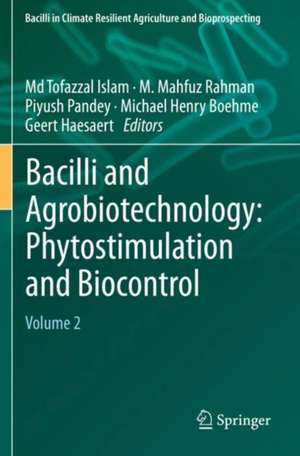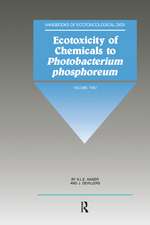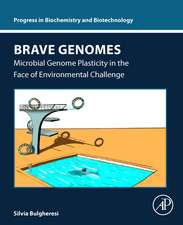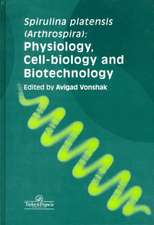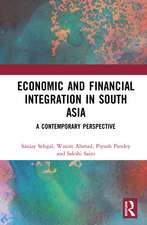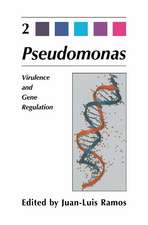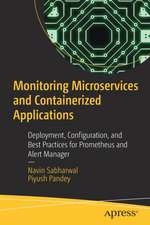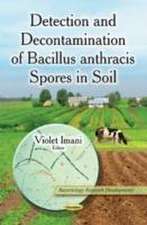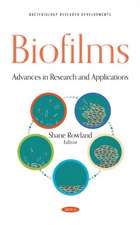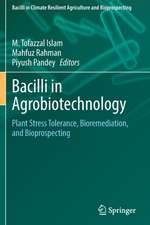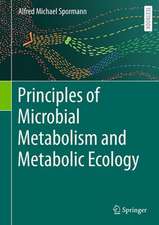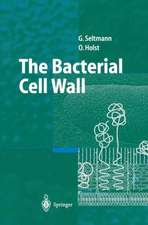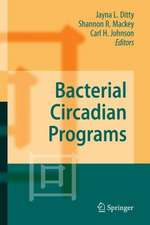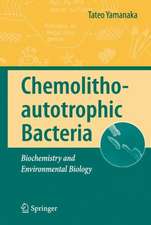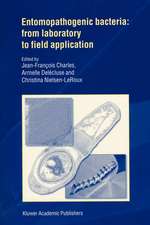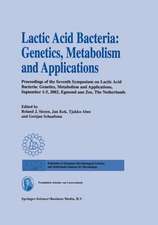Bacilli and Agrobiotechnology: Phytostimulation and Biocontrol: Volume 2: Bacilli in Climate Resilient Agriculture and Bioprospecting
Editat de Md Tofazzal Islam, M. Mahfuz Rahman, Piyush Pandey, Michael Henry Boehme, Geert Haesaerten Limba Engleză Paperback – 26 aug 2021
| Toate formatele și edițiile | Preț | Express |
|---|---|---|
| Paperback (1) | 838.41 lei 38-44 zile | |
| Springer International Publishing – 26 aug 2021 | 838.41 lei 38-44 zile | |
| Mixed media product (1) | 1008.12 lei 3-5 săpt. | |
| Springer International Publishing – 2 ian 2020 | 1008.12 lei 3-5 săpt. |
Preț: 838.41 lei
Preț vechi: 1103.18 lei
-24% Nou
Puncte Express: 1258
Preț estimativ în valută:
160.45€ • 166.89$ • 132.46£
160.45€ • 166.89$ • 132.46£
Carte tipărită la comandă
Livrare economică 10-16 aprilie
Preluare comenzi: 021 569.72.76
Specificații
ISBN-13: 9783030151775
ISBN-10: 3030151778
Pagini: 335
Ilustrații: VI, 335 p. 66 illus., 26 illus. in color.
Dimensiuni: 155 x 235 mm
Ediția:2019
Editura: Springer International Publishing
Colecția Springer
Seria Bacilli in Climate Resilient Agriculture and Bioprospecting
Locul publicării:Cham, Switzerland
ISBN-10: 3030151778
Pagini: 335
Ilustrații: VI, 335 p. 66 illus., 26 illus. in color.
Dimensiuni: 155 x 235 mm
Ediția:2019
Editura: Springer International Publishing
Colecția Springer
Seria Bacilli in Climate Resilient Agriculture and Bioprospecting
Locul publicării:Cham, Switzerland
Cuprins
1. Management of fungal diseases on cucumber (Cucumis sativus L.) and tomato (Solanum lycopersicum L.) crops in greenhouses using Bacillus subtilis.- 2. Bacillus species: A potential plant growth regulator.- 3. Bacilli in the Biocontrol of Mycotoxins.- 4. Bacillus subtilis and its effect on the post-harvest of fruit and flowers.- 5. Plant growth-promotion by ACC deaminase-producing Bacilli under salt stress conditions.- 6. Bacillus subtilis-mediated Abiotic Stress Tolerance in Plant.- 7. Exploring the Utility of Aneurinibacillus as a Bioinoculant for Sustainable Crop Production and Environmental Applications.- 8. Phylogeny and Taxonomy of agriculturally important Bacillus species.- 9. Endophytic Bacillus species induced systemic resistance to plant diseases.- 10. Genomics and Post-genomics Approaches for Elucidating Molecular Mechanisms of Plant Growth Promoting Bacilli.- 11. Tapping the Potential of Metabolomics in New Natural Products Discovery from Bacillus Species.- 12. Genomicinsights and comparative genomics of Bacillus species having diverse mechanisms of biocontrol against fungal phytopathogens.- 13. Bacillus species as biocontrol agents for fungal plant pathogens.- 14. Application Method and Efficacy of Bacillus spp in Mitigating Abiotic and Biotic Stresses and Enhancing Plant Performance.- 15. Bacillus thuringiensis-based Gene Pyramiding a way Forward for a Combined Horizontal and Vertical Resistance in Plant.- 16. Probiotic Bacilli in Sustainable Aquaculture.
Notă biografică
Editors:
Prof. Michael Henry Boehme, Humboldt University of Berlin, Faculty of Life Sciences
Prof. M. Tofazzal Islam, Bangladesh Sheikh Mujibur Rahman Agr Uni, Department of Biotechnology,
Dr. M. Mahfuz Rahman, West Virginia University
Prof. Piyush Pandey, Assam University, Department of Microbiology
Prof. Geert Haesaert, Ghent University, Department Applied Biosciences
Textul de pe ultima copertă
This book provides a comprehensive resource for researchers and students involved with studying the roles of Bacilli in sustainable crop production technologies. Chapters included in the book not only elaborate on beneficial traits of Bacilli, but also highlight utilization of these microbes for producing industrially important antibiotics, enzymes, probiotics and other useful biochemicals.
Feeding ever increasing world population from shrinking arable acreage led to a synthetic input (fertilizer, growth regulator, pesticide etc.) based crop production system, which has been creating both environmental and health hazards and may also make the whole production system unsustainable. Researchers, food producers and consumers alike, now realize that this world needs effective, environmentally smart agricultural technologies that are safe for people use less synthetic inputs and protect natural resources. To overcome the challenge of increasing food production witha significant reduction of agrochemicals use, a great deal of interest and research have been devoted to beneficial microorganisms/biostimulants in recent days with noteworthy positive results. Bacillus based biopesticide together with other bio-rational approaches may play a critical role in helping all the key drivers of sustainable, environmentally responsible food production with enhanced food quality. Although multiple strains of Bacillus spp. showed promise to contribute to the sustainable agriculture by making nutrients available to plants, providing additional defense to adverse abiotic and biotic stresses, research on Bacillus based product formulation, rate and crop selection, optimization of application timing are urgently needed. As crop plants are more vulnerable to abiotic and biotic stresses at the seedling stage, optimization of application timing should aid in alleviating those stresses for the successful completion of life cycle of a plant.
Feeding ever increasing world population from shrinking arable acreage led to a synthetic input (fertilizer, growth regulator, pesticide etc.) based crop production system, which has been creating both environmental and health hazards and may also make the whole production system unsustainable. Researchers, food producers and consumers alike, now realize that this world needs effective, environmentally smart agricultural technologies that are safe for people use less synthetic inputs and protect natural resources. To overcome the challenge of increasing food production witha significant reduction of agrochemicals use, a great deal of interest and research have been devoted to beneficial microorganisms/biostimulants in recent days with noteworthy positive results. Bacillus based biopesticide together with other bio-rational approaches may play a critical role in helping all the key drivers of sustainable, environmentally responsible food production with enhanced food quality. Although multiple strains of Bacillus spp. showed promise to contribute to the sustainable agriculture by making nutrients available to plants, providing additional defense to adverse abiotic and biotic stresses, research on Bacillus based product formulation, rate and crop selection, optimization of application timing are urgently needed. As crop plants are more vulnerable to abiotic and biotic stresses at the seedling stage, optimization of application timing should aid in alleviating those stresses for the successful completion of life cycle of a plant.
Caracteristici
Most comprehensive list of latest research findings on agriculturally and industrially important microbial genus Bacillus and many species and strains under it Futures research direction on applied aspects encompassing genomics, post genomics, proteomics and metabolomics of the genus Bacillus Detailed illustration of modes of action of multiple Bacillus strains providing beneficial effects to plants and production of industrially important metabolites
